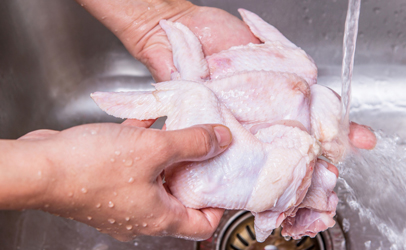 afety Week on Monday, Britain’s Food Standards Agency launched a campaign to educate consumers about Campylobacter and particularly to get consumers to stop washing raw chicken in order to reduce the risk of infection.
afety Week on Monday, Britain’s Food Standards Agency launched a campaign to educate consumers about Campylobacter and particularly to get consumers to stop washing raw chicken in order to reduce the risk of infection.The call comes as new figures show that 44 percent of people always wash chicken before cooking it — a practice that can spread Campylobacter bacteria onto hands, work surfaces, clothing and cooking equipment through the splashing of water droplets.
Last summer, Drexel’s Jennifer Quinian informed the U.S. public to skip washing poultry in order to minimize cross-contamination.
Campylobacter is the most common form of food poisoning in the UK, affecting an estimated 280,000 people a year. Around four in five of these cases come from contaminated poultry.
In England specifically, data released Monday by Public Health England (PHE) show that there have been 1,595 people affected in outbreaks of food poisoning caused by Campylobacter bacteria since 2000, and all the cases have been associated with the consumption of poultry products. Of these, 80 percent had reported eating chicken liver dishes.
Illness from Campylobacter can cause abdominal pain, severe diarrhea and vomiting. In certain cases, it can lead to irritable bowel syndrome, reactive arthritis and Guillain-Barré syndrome, a serious condition of the nervous system.
“Although people tend to follow recommended practice when handling poultry, such as washing hands after touching raw chicken and making sure it is thoroughly cooked, our research has found that washing raw chicken is also common practice,” said Catherine Brown, FSA chief executive.
A survey commissioned by FSA found that levels of awareness about Campylobacter are well below that of other forms of food poisoning. The data showed that more than 90 percent of the public have heard of Salmonella and E. coli, but only 28 percent know about Campylobacter. And, of the people who have heard of Campylobacter, only about a third of them know that poultry is the main source of the bacteria.
The agency’s campaign deals with the whole food chain, working with farmers and producers to reduce rates of Campylobacter in flocks of broiler chickens and ensuring that slaughterhouses and processors are taking steps to minimize the levels of contamination in birds.
FSA has also asked production companies that make food shows to not show people washing raw chicken on TV.
“Out of a number of possible risk factors, the greatest by far is eating or handling poultry meat, which is why we are urging people during Food Safety Week to pay attention to how they store and handle chicken and other poultry meat at home,” said Dr. Bob Adak, head of the gastrointestinal diseases department at PHE.





